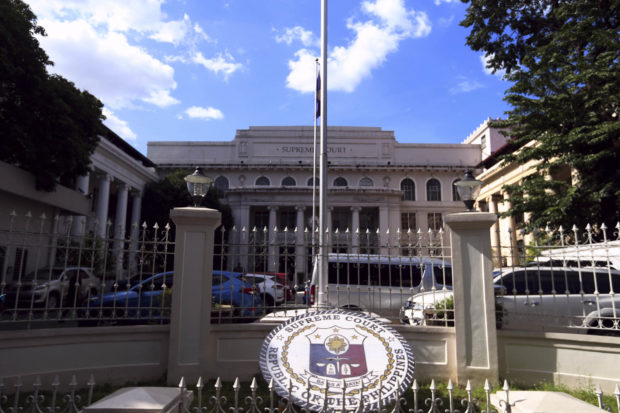
BASTION OF RIGHTS The Supreme Court building in Ermita, Manila. INQUIRER file photo / EDWIN BACASMAS
MANILA, Philippines — Human-rights advocates on Tuesday prodded the Supreme Court to act on their petition in hopes that protection will be given to those who needed it before its too late.
The groups, led by Karapatan, in a manifestation, urged the high court to “re-examine its understanding of red-tagging and terrorist-labeling and finally see the same as threats to the people’s right to life, liberty, and security.”
Citing the case of paralegal Zara Alvarez, members of the group said Alvarez was among those who sought protection from the courts last year. The case, however, was dismissed by the Court of Appeals.
In dismissing the case, the Appeals Court said: “It is speculative for petitioners to claim that all members or supporters of leftist organizations are in danger of neutralization as enemies of the state.”
Alvarez was red-tagged, charged, and detained for nine-months until the case was dismissed for lack of evidence. Her name was included in the over 600 personalities identified by the Department of Justice as “communist.” Although her name was eventually removed, threats against her continued. Last Aug. 17, 2020, she was shot to death.
“Her death proves that being subjected to red-tagging and terrorist-labeling constitutes an actual threat and not merely one of supposition with the likelihood of happening,” they said.
Aside from Alvarez, petitioners also mentioned the cases of peace consultants Randal Echanis and Randy Malayao who were both branded as “communists.” Malayao was shot to death inside a bus early last year while Echanis who was also killed last month received multiple injuries to the head and several stab wounds.
“Petitioners submit that the merits of the subject petition be examined in light of these events. It can be recalled that the Court a quo (Court of Appeals) precipitously dismissed the petition with inexplicable skepticism, holding, among others, that ‘there was no evidence that the alleged killings and disappearances are on account of the victims’ membership in organizations tagged as legal fronts even without giving petitioners the opportunity to present such evidence. Petitioners were, in effect, deprived of their fundamental right to due process,” they said.
In June 2019, after conducting a summary hearing, the Court of Appeals dismissed the petition for a writ of amparo. Writ of Amparo “is a remedy available to any person whose right to life, liberty, and security is violated or threatened with violation by an unlawful act or omission of a public official or employee, or of a private individual or entity.”
The case was elevated and remains pending before the Supreme Court.